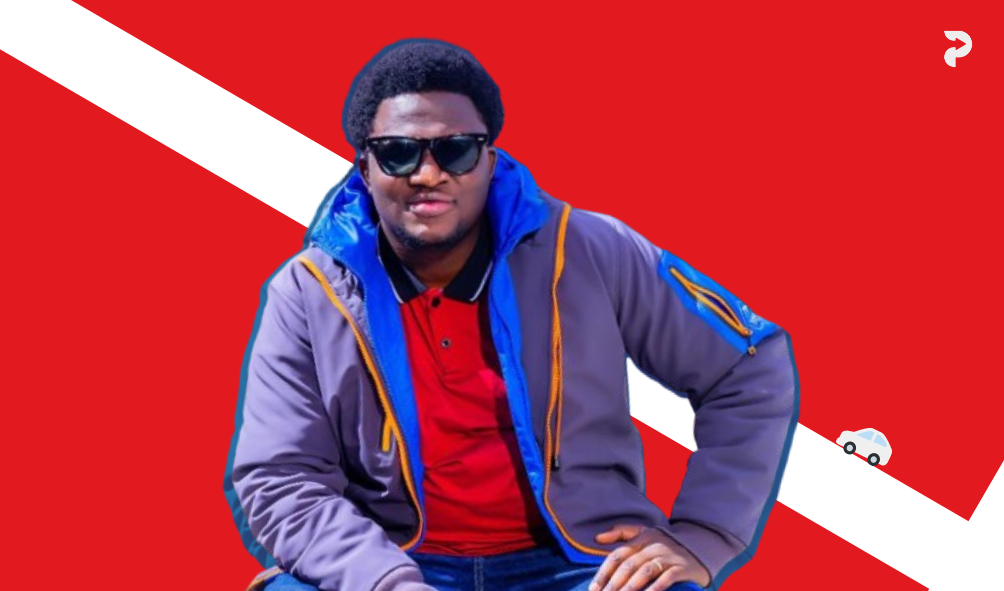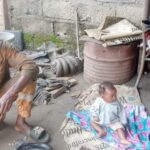Oluwatomi Waziri started September 12th, 2019, just like any other day. He prepped for work, fueled up with breakfast, and offered a silent prayer for a day that edged him closer to his dreams. Everything seemed on track until the Lagos evening. Waziri, an Uber driver at the time, received a pick-up request in Victoria Island, bound for the mainland.
“I asked the rider [passenger] if I should use Google Maps or if she could direct me, and she suggested using Google Maps. It took us through Abopo Bridge, where we encountered a little bit of traffic,” Mr. Waziri recalled.
Unbeknownst to him, fate was about to take him on a different turn. “I noticed two young men walking by,” he recounted. “ At first, I thought they were just coming back from work, but they were looking into my car suspiciously, which made me uneasy,” he said, Just moments later, his unease solidified. “One of them reached into his pocket, then approached my door,” Waziri continued. “The other flanked my passenger. The one by me pulled out a gun, demanding our phones.”
Fear gripped Waziri and he reached for his phone, which was between the driver’s seat and the passenger seat. “As I tried to wind down, I heard a gunshot and immediately passed out”
Waziri had been shot in the face. Minutes later, the sound of his passenger’s screams jolted him awake. “I couldn’t see anything, and there was a loud ringing in my ears,” he said. “The rider [passenger] and I were left in the car, both in shock and screaming for help, but no one stopped.”
The agonizing aftermath unfolded slowly. “Then, in the next 30 minutes or so, I heard the voices of two policemen,” said Waziri. “I didn’t know they were policemen until they introduced themselves.” and they rushed him to the military hospital at Tiaa.
By the journey’s end, Waziri was wracked with pain. “Even while in the car, I was begging the policemen to finish me off,” he recalled, his voice strained. “I was screaming, yelling, and shouting.”
At the hospital, first aid and treatment started. An X-ray revealed the brutal truth: the pellets had damaged his eyes and lodged under his brain. “Multiple pellets are still there even as I speak,” he said with quiet strength.
The next day, a more devastating blow struck at Lagos State University Teaching Hospital. Doctors delivered the shocking news: “I may not be able to see again.”
Depression sets in
What followed was depression, solitude, and the urge to commit suicide. “I just went mute.” Waziri stated “I was scared, full of fears, worries, and doubts,” he added.
Waziri, then 27, had always known the world through sight. The thought of doing life without it sent him spiraling. Tears welled up easily, a reminder of his shattered reality. Waziri said “ I felt empty, worthless, and worried about how people would perceive me now, especially my friends. How would they see me as a person with a disability?”
Waziri’s fears were not unfounded. Nigeria, Africa’s most populous democracy, had a dark underbelly when it came to disability inclusion. People with disabilities like him often faced discrimination, relegated to the fringes of society. Public infrastructure, from transportation to hospitals, remained stubbornly inaccessible, and designed for a world that didn’t consider their needs.
Without assistance, navigating daily life in Nigeria as a PWD was an almost insurmountable challenge, and despite government efforts through the enactment of the Discrimination Against Persons with Disabilities Act 2018, the needle has barely moved, and PWDs are left with the burden of its non-implementation.
“There were times I asked the doctors to just finish me off.” he said, “I even told them to inject me so I could die and end it all.” Waziri was in a dark place until something happened.
A new born
One morning, Waziri woke up to the sound of his mother’s voice. “she was weeping in Yoruba and said something that struck me deeply. She cried out, “My child, I gave birth to you with two eyes, in Yoruba.”
Waziri said that moment made him realize “how my depression was affecting those around me,” adding that “I found myself thinking that if I continued down this path, I would cause even more pain for my loved ones. The thought of what might happen to them if I didn’t survive and ended up taking my own life was unbearable.”
From that realization, Waziri picked himself up and started self-evaluating himself. “I decided to turn off that destructive switch in my mind and focus on picking myself back up. I realized that I could transform my mess into a message of hope. So, I started working towards that goal,” he said.
Waziri added, “It was that thought – if I come out of this, I can inspire people, make them happy, and encourage someone who is just about to give up – that became the turning point for me.”
So, Waziri changed his perspective on life. “I began to see life differently, understanding that anything can happen to anyone at any time. This shift in mindset made me appreciate many things I used to take for granted, especially my sight. I realized how much I had taken for granted in my life.”
Despite his ordeal, Waziri, now residing in Canada, has dedicated his life to inspiring others. A champion for mental health awareness, he also serves as an ambassador for the Resource Center for the Blind in Nigeria.
“This experience has instilled a profound sense of gratitude within me,” Waziri reflects. “My well-being, particularly my mental health, is a top priority now. While I may never see again, it doesn’t mean my life is over.”
Waziri acknowledges the challenges of his situation. “Sometimes, I miss the things I used to do,” he confides. “There are moments of sadness, of course. But you learn to pick yourself up after those moments.”
He emphasizes the importance of facing challenges head-on. “Challenges are inevitable,” he states. “We shouldn’t shy away from them, but rather learn and grow from them. By embracing them, we can emerge stronger.”
Waziri finds solace in a familiar adage: “What doesn’t kill us makes us stronger,” he said. “Behind my smile lies a journey marked by tears. But my true source of strength is my family.”
He describes the unwavering support of his loved ones. “I am incredibly fortunate to have a loving wife and two beautiful children, a boy and a girl.”
Living with a disability, Waziri recognizes the impact his story has on others. “I know my experiences inspire people,” he says. “That’s my purpose, my legacy. I want people to understand that I never gave up, even in the face of despair. That, for me, is truly inspiring,” Waziri said.
Oluwatomi Waziri, an Uber driver in Lagos, faced a harrowing experience on September 12th, 2019, when he was shot in the face by robbers. The incident left him partially unconscious, only to awaken in a state of confusion and pain. Police eventually arrived and took him to a military hospital, where he learned that the pellets had severely damaged his eyes, making the possibility of seeing again slim.
Waziri spiraled into depression, feeling worthless and contemplating suicide, especially given the societal discrimination in Nigeria against persons with disabilities. However, a heartfelt plea from his mother and the realization of the pain his depression was causing his loved ones prompted him to change his outlook.
Determined to turn his ordeal into a message of hope, Waziri started focusing on rebuilding his life. Now living in Canada, he has become an advocate for mental health and champions the cause of the visually impaired, working as an ambassador for the Resource Center for the Blind in Nigeria. He credits his family’s unwavering support for his resilience and finds strength in inspiring others with his story.






